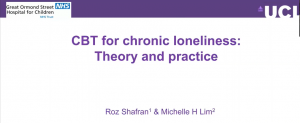Sorry, this product is no longer available for viewing
Master Clinician webinar series
CBT for chronic loneliness: theory and practice
Professor Roz Shafran (University College London) with Dr Michelle Lim (Swinburne University of Technology)

This 1hr 43min Master Clinician series webinar was recorded in May 2020.
AACBT members can view for free.
Non-members may purchase here.

Chronic loneliness plagues many of our clients and COVID-19 presents new challenges. Learn how to use CBT to help your clients improve their social connections.
It is now widely accepted that chronic loneliness is a common problem affecting people of all ages. Such loneliness is typically conceptualised as ‘A subjective, unwelcome feeling of lack or loss of companionship. It happens when we have a mismatch between the quantity and quality of social relationships that we have, and those that we want’ (Perlman & Peplau, 1982). The experience of chronic loneliness is influenced by a combination of psychological factors, including mental health problems, and the relationship between chronic loneliness and mental health problems appears bi-directional.
This webinar will:
- Provide an update on the evidence with regard to psychological therapies for chronic loneliness including (but not limited to) cognitive behaviour therapy
- Describe the CBT intervention evaluated in a recent internet based trial of CBT for chronic loneliness and present preliminary data on its efficacy
- Present a new modular CBT approach to addressing chronic loneliness that aims to account for the range of presentations seen across different populations.
Key Learning Objectives
- Knowledge of the evidence-based for psychological therapies for chronic loneliness
- Gain knowledge of the relationship between loneliness and mental health problems across the age range
- Gain CBT skills to help address chronic loneliness
The skills and knowledge presented in this webinar will facilitate and enhance clinical practice by increasing awareness of the assessment and treatment of chronic loneliness, and its association with mental health disorders.
References:
Käll, A., Shafran, R., Lindegaard, T., Bennett, S., Cooper, Z., Coughtrey, A., & Andersson, G. (2020). A common elements approach to the development of a modular cognitive behavioral theory for chronic loneliness. Journal of Consulting and Clinical Psychology, 88(3), 269.
Käll, A., Backlund, U., Shafran, R., & Andersson, G. (2020). Lonesome no more? A two-year follow-up of internet-administered cognitive behavioral therapy for loneliness. Internet Interventions, 19, 100301.
Lim, M. H., Rodebaugh, T. L., Zyphur, M. J., & Gleeson, J. F. (2016). Loneliness over time: The crucial role of social anxiety. Journal of abnormal psychology, 125(5), 620.
Biographical Information
Roz Shafran is Professor of Translational Psychology at the UCL Great Ormond Street Institute of Child Health. She has over 200 publications in the field of the development and evaluation of cognitive behavioural theory and therapy across the age range both for specific disorders such as obsessive compulsive disorder and transdiagnostic problems such as loneliness and perfectionism. She is one of the pioneers of the transdiagnostic approach to eating disorders and, with colleagues in Oxford, she developed the original cognitive behavioural approach to the understanding and treatment of clinical perfectionism. She is the recipient of several awards and recently was the first recipient of the Eric Taylor Award for Translational Research Into Practice Award given by the Association for Child and Adolescent Mental Health. She is the recipient of several research and training grants, including as a co-applicant involved in the UKRI Loneliness and in Mental Health network.
Dr Michelle Lim is a Senior Lecturer in Clinical Psychology and leads the Social Health and Wellbeing (SHAW) Laboratory. Michelle is interested in how loneliness can negatively impact social functioning and exacerbate mental health symptoms (e.g., social anxiety, depression, and paranoia). She focuses on the development and evaluation of evidence-based solutions that can address loneliness in young people with first episode psychosis, social anxiety disorder, as well as nonclinical populations across the lifespan. Dr Lim’s interests extend to the development and implementation of personalised mental health, cognitive biases in psychopathology, sub-clinical psychotic symptoms, decision-making, and emotion regulation processes.

